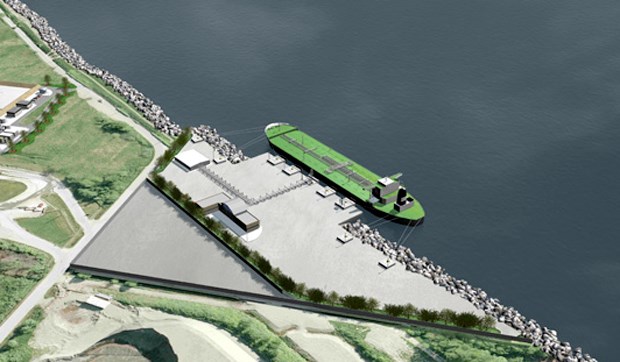The B.C. government’s decision to grant an airline consortium environmental approval of its plan to barge jet fuel up the Fraser River has been branded “pathetic” and “misguided.”
Otto Langer, former federal fisheries biologist and member of protest group VAPOR, didn’t mince his words when asked for reaction to Environment Minister Mary Polak’s 3 p.m. announcement on Thursday — almost three years into what should have been a 180-day process.
Langer, however, was as unsurprised as he was dismayed by the issuance of a conditional environmental certificate to proponents VAFFC to barge the fuel up the south arm of the Fraser, off-load it a terminal on the banks of the river and then pipe it up Highway 99 and through north Richmond to YVR.
“There’s nothing new here and we could have told you a year ago about these conditions,” said Langer, in reference to the 64 conditions placed on VAFFC and of the air of inevitability he and VAPOR felt hung over the decision.
“The writing was on the wall long before today and the only reason they delayed this decision earlier this year was because of the election.”
Langer rubbished Polak’s claim of the decision-making process being “rigorous,” adding that there’s not even been one public hearing and that alternatives to the approved plan were ignored.
Also ignored, according to Langer and the City of Richmond, were concerns of the public and the city’s fire-rescue department, the latter of which has said it can’t respond in time to any major incident at or near the proposed fuel off-loading facility.
In a conference call Thursday afternoon involving the News, Minister Polak gave assurances that the onus on responding to a major fire at the facility has been placed on VAFFC, with conditions to match that responsibility.
Polak added there will be “rigorous” follow-up inspections, a “series of reports” and “ongoing monitoring” of the project in the coming months and years.
VAFFC’s project director, Adrian Pollard, said he was “obviously pleased” that a “long, long process” had finally ended, before adding that more hurdles were still to be negotiated.
“A lot of work and dedication has gone into this and there were times when we had our doubts,” said Pollard.
Of the 64 conditions, Pollard said there were no surprises in there, as they had been involved in the working group which recommended them.
“Obviously, this is a major (hurdle), but there is still the federal decision to be made,” added Pollard in reference to Port Metro Vancouver’s pending permit.
And in terms of the condition that VAFFC work with the City of Richmond — which has opposed the plan from the outset — to come up with a “fire safety plan,” Pollard said he was confident many of the city’s fears would be alleviated when it sees the fire response plans in greater detail.
In a brief statement as the News went to press, the City of Richmond said it still has serious concerns with the plan, which it believes still contains “significant flaws.”
* Key conditions, according to the government, for the Vancouver Airport Fuel Delivery project include
the following related to spill and fire prevention, preparedness and response:
* At least two escort tugs for each tanker and one tug for each cargo barge coming into the marine terminal.
* Vessels will be under the expert control of pilots specifically trained for the Fraser River environment.
* Specify that all aviation fuel delivery vessels using the facility are: Pre-screened through a tanker acceptance program before they enter
Canadian waters; double-hulled and insured for pollution liability at the prevailing industry standard and that coverage limits are sufficient to insure the potential liability of the vessel owner and operator to cover emergency spill response, clean-up, and environmental remediation and to compensate for loss by aboriginal food, social, and ceremonial fishers licensed under the Fisheries Act caused by a spill of aviation fuel from the vessel.
* Regular cleaning and integrity inspections during pipeline operation.
* Automatic leak detection system and automatic and manual shut-off systems.
* A Fire Safety Plan prepared and implemented in consultation with the City of Richmond Fire-Rescue, the Corporation of Delta Fire, Provincial Emergency Services, and the BC Oil and Gas Commission.
* Firefighting systems at the fuel-receiving facility and marine terminal that will protect fuel transfer areas and storage tanks, including: A high-expansion foam fire protection system connected to a fixed foam storage and dispensing unit at the fuel-receiving facility; automated fire detection systems and a fire hydrant system.
More information on the Vancouver Airport Fuel Delivery project can be found on the Environmental Assessment Office website at: http://a100.gov.bc.ca/appsdata/epic/html/deploy/epic_project_doc_list_346_a_new.html



